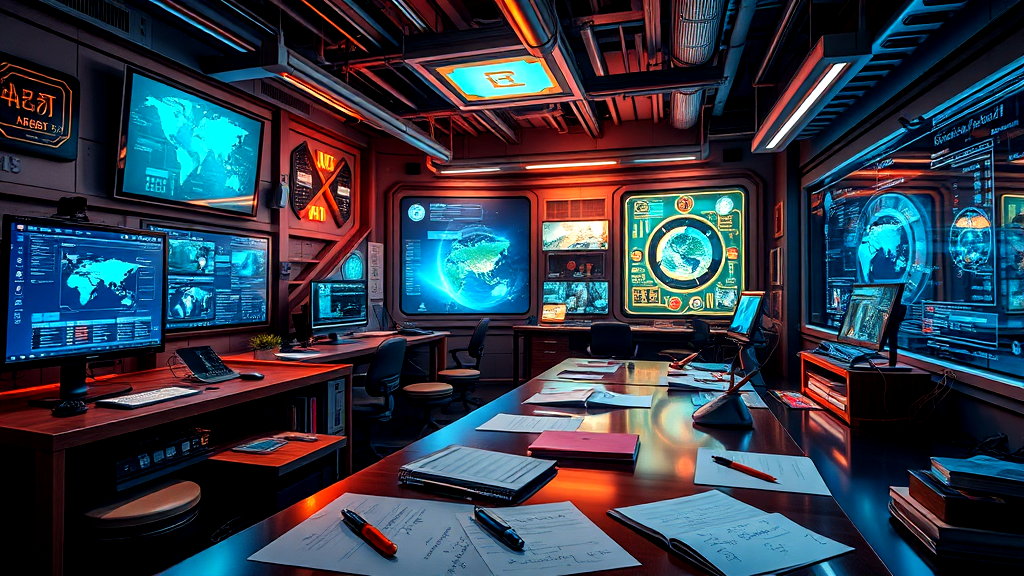AI Translation and Skill Evolution
AI is reshaping how we view translation. It’s not just a tool but a partner. By breaking language barriers, AI boosts global education, making it more inclusive. Imagine a classroom where students from across the world understand each other seamlessly. This isn’t just a dream. It’s happening right now.
While AI handles the heavy lifting, the human touch adds depth. It’s like a dance, where each partner brings something unique. Human insight ensures cultural nuances aren’t lost in translation. This blend of AI and human creativity can lead to truly generative solutions.
The future? It’s bright and full of potential future implications for international education practice. I can’t wait to see what’s next!
Key Takeaways
-
AI breaks language barriers, boosting global education inclusivity.
-
Human touch in translation captures cultural nuances.
-
Generative solutions arise from AI and human collaboration.
-
Adaptability and learning are key in the Fourth Industrial Revolution.
-
Managing AI ethically enhances human potential.

How AI Translation is Shaping Industries
How AI translation reshapes the business world is nothing short of fascinating. This technological marvel opens doors for industries to expand globally with ease. Real-time tools knock language barriers out of the park, making communication as smooth as silk. I mean, why bother with the Tower of Babel when AI’s got your back, right?
AI translation benefits are like a gift that keeps on giving. Companies gain efficiency, saving both time and resources. Imagine closing deals across continents without breaking a sweat. It’s like having a multilingual wizard in your pocket, ready to impress clients at any moment.
Moreover, the impact on global education is mind-blowing. Students from diverse backgrounds access courses they never dreamed of, thanks to AI’s magic touch. It’s a small world, after all, when you can learn from international education sources without missing a beat.
Of course, the human touch remains irreplaceable. AI can churn out translations at lightning speed, but it lacks the heart of a human. Those cultural nuances and emotional subtleties? That’s where we shine. It’s a dance between man and machine, with each playing a crucial role.
Generative solutions are leading the charge here. They combine AI’s efficiency with our instinctive creativity. The result? A powerful partnership that elevates industries to new heights. And as we navigate this brave new world, adapting to AI’s evolving capabilities is key.
In short, AI translation is a game-changer. It empowers industries, fosters global connections, and enriches learning experiences. But let’s not forget the human touch, ensuring that communication remains vibrant and full of life.
|
Industry |
AI Translation Benefits |
Human Element |
Future Outlook |
|---|---|---|---|
|
Business |
Enhanced efficiency, cost-saving |
Cultural understanding |
Rapid global expansion |
|
Education |
Access to diverse resources |
Emotional resonance |
Worldwide collaboration |
|
Healthcare |
Improved patient communication |
Ethical considerations |
Better outcomes |
|
Tourism |
Personalized experiences |
Authentic interactions |
Increased satisfaction |
|
Media |
Wider audience reach |
Creative storytelling |
Engaging content |

Exploring AI and Human Content Creation
Venturing into content creation with AI and human effort presents unique opportunities. AI excels in generating quick, data-driven insights, yet human creativity remains irreplaceable. This blend produces content that speaks to the heart while AI handles the heavy lifting. One might say I’m the conductor, directing AI to hit the high notes while I add depth and color.
The ai translation benefits are a significant part of this symphony. AI’s power to break language barriers is unmatched, but it sometimes misses the emotional undertones. That’s where my human touch steps in, ensuring the message resonates across cultures. When I combine AI’s speed with my understanding, we create content that truly connects with people from different backgrounds.
Imagine a world where AI and I craft stories that transcend borders. AI offers a global perspective, but my insights make them personal. It’s not just about translating words; it’s about conveying the essence of a message. In doing so, I play a critical role in promoting both international and global education, ensuring these narratives reach every corner of the world.
Here’s a little table showcasing AI and human collaboration in various sectors:
|
Sector |
AI Translation Benefits |
Human Contribution |
Outcome |
|---|---|---|---|
|
Business |
Cost-saving, rapid expansion |
Cultural understanding |
Enhanced global reach |
|
Education |
Diverse resource access |
Emotional resonance |
Broader and inclusive learning |
|
Healthcare |
Improved patient communication |
Ethical oversight |
Better patient outcomes |
|
Tourism |
Personalized experiences |
Authentic interactions |
Increased tourist satisfaction |
|
Media |
Wider audience reach |
Creative storytelling |
Engaging and memorable content |
By working together, AI and I can create content that’s both informative and soulful, bridging the gap between technology and emotion.

The Role of Human Writers in Translation
The involvement of writers ensures that translations go beyond literal interpretation. While AI translation benefits are clear, it often lacks the emotional depth and cultural sensitivity that human insight provides. Writers bring a unique touch to translations, capturing nuances that machines might miss. For example, consider the difference between a machine translating “break a leg” literally and a human understanding the idiom’s intent. AI can be a powerful tool, but it’s the experienced writer who ensures the message resonates culturally and emotionally.
A critical consideration is the ethical dimension. Writers review AI-generated translations to avoid biases or inaccuracies. Imagine a generative AI translating sensitive content without understanding cultural contexts—risky, right? Writers provide that layer of scrutiny, ensuring translations meet ethical standards. It’s not just about words; it’s about meaning, context, and impact.
Moreover, writers contribute creativity and strategic insight. While AI churns out text efficiently, it’s the human touch that crafts a narrative, tells a compelling story, or adds a dash of humor. This collaboration ensures high-quality content that engages audiences across borders. Think of it as a duet where AI handles the tempo, while the writer provides the melody.
In the end, the synergy between AI and writers is like a well-oiled machine. Together, they create translations that are not just accurate, but also authentic and heartfelt. This fusion of technology and creativity is the future of the translation industry.
|
Area |
AI Translation Benefits |
Human Writer Contributions |
Outcome |
|---|---|---|---|
|
Business |
Efficiency |
Cultural relevance |
Effective global communication |
|
Education |
Accessibility |
Emotional depth |
Inclusive learning |
|
Healthcare |
Rapid information |
Ethical oversight |
Better patient outcomes |
|
Media |
Faster content creation |
Storytelling |
Engaging content |
|
Tourism |
Language support |
Personal touch |
Authentic experiences |
-
Ensuring ethical standards in translations.
-
Capturing cultural nuances and emotional depth.
-
Providing creative and strategic insights.
-
Avoiding biases and inaccuracies.
-
Engaging audiences with compelling narratives.
-
Enhancing AI-generated content with human oversight.
-
Crafting translations that resonate authentically.
-
Balancing efficiency with cultural relevance.

Skills Required in the Fourth Industrial Revolution
Exploring the skills necessary to thrive in the Fourth Industrial Revolution reveals an intriguing mix of technical prowess and soft skills. As industries rapidly evolve, staying adaptable is key. I find emotional intelligence, critical thinking, and active listening are becoming increasingly valued, complementing AI’s technical capabilities.
In the world of AI translation, I notice fascinating benefits like breaking language barriers and promoting collaboration. But, I also see the need for creativity and strategic insight. Managing AI systems ethically and effectively is a skill in itself. Imagine a dance, where humans and AI gracefully move together, each enhancing the other’s strengths.
Here’s a table that captures the essence of these evolving skills:
|
Skill |
Importance |
AI Translation Benefits |
Real-world Application |
|---|---|---|---|
|
Emotional Intelligence |
High |
Enhances team communication |
Leadership Roles |
|
Critical Thinking |
High |
Solves complex problems |
Decision Making |
|
Active Listening |
Medium |
Improves collaboration |
Customer Service |
|
Adaptability |
High |
Responds to AI advancements |
Career Growth |
|
AI Management |
High |
Ensures ethical use |
IT and Tech Industries |
I’ve always believed in the power of continuous learning. Here’s a handy list of skills I think are essential today:
-
Emotional intelligence for better teamwork.
-
Critical thinking to tackle unseen challenges.
-
Active listening to enhance communication.
-
Adaptability to keep up with fast-paced changes.
-
AI management to harness AI responsibly.
-
Creativity to foster innovation.
-
Strategic insight for effective planning.
Discover more on how these skills intertwine with AI in this insightful study.
Conclusion
AI’s impact on translation is like adding a turbo boost to communication. It breaks language barriers, fostering worldwide connections. Yet, human touch is the secret sauce that makes translations truly resonate. Without it, we risk losing cultural flavor and emotional depth.
I see AI as a trusty sidekick, not a replacement. It handles the heavy lifting, leaving humans to add creativity and heart. This teamwork is the future. As we ride this wave of innovation, let’s focus on blending AI’s strengths with our own. This approach will help us thrive in this new era. Balancing technology with human insight is the key to unlocking endless possibilities.
FAQ
-
How is AI changing the way we translate?
AI is a game-changer in translation. It breaks language barriers quickly. Real-time tools make communication smoother. Industries now collaborate more globally.
-
Can AI replace human writers entirely?
Not quite. AI handles routine tasks well. But for creativity, humans are essential. AI lacks our emotional touch and cultural insight.
-
What skills should I develop for the Fourth Industrial Revolution?
Adaptability is key. Learn both technical and soft skills. Emotional intelligence and critical thinking shine alongside AI.
-
Why are human writers important in AI translation?
We capture cultural nuances AI misses. Our oversight avoids biases and inaccuracies. Combining AI and human skills leads to authentic translations.
-
How does AI benefit businesses beyond translation?
AI boosts efficiency and innovation. It helps businesses stay competitive. Inclusivity and diverse environments thrive with AI’s help.




